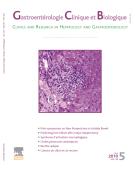Impact of therapeutic interventions induced by capsule endoscopy on long term outcome in chronic obscure GI bleeding - 17/04/08
 , Jesús Arturo Armenta 3, Cesar Marrufo 1, Jose A. Gonzalez 1, Héctor Maldonado 1
, Jesús Arturo Armenta 3, Cesar Marrufo 1, Jose A. Gonzalez 1, Héctor Maldonado 1Summary |
Background |
The diagnostic yield and the clinical impact of capsule endoscopy (CE) in obscure gastrointestinal bleeding (OGIB) are well known. The aim of this study was to determine the impact of therapeutic interventions induced by CE findings on long term outcome.
Patients and methods |
Patients with chronic OGIB referred to our center from September 2003 to June 2005 for CE were included. Treatment of intestinal lesions was prescribed according to the clinical characteristics of patients and the nature of the lesions.
Results |
Forty patients were included, 18 females and 22 males. Median age was 54 yrs (range: 5-87) with a median follow-up of 13 months (range: 6-22). The diagnostic yield of CE was 75% (30/40). From 30 patients with positive CE, 16 received treatment (Group I) and 14 did not (Group II). Thus clinical impact was 40%. Ten patients had negative CE (Group III). During follow-up, bleeding recurrence was observed in only 1 patient from Group I (6%), 5 from Group II (36%) and 1 from Group III (10%). There were only significant differences between Group I vs Group II (P=0.002).
Conclusions |
CE results had a favorable influence in patient outcome allowing for specific treatment as they showed significantly reduced recurrent bleeding.
Il testo completo di questo articolo è disponibile in PDF.Résumé |
Objectifs |
L’impact clinique et le rendement diagnostique de la vidéocapsule endoscopique (VCE) sont connus en cas de saignement digestif d’origine inconnue (SDOI). Le but de cette étude était de déterminer l’impact des actes thérapeutiques induits par la vidéocapsule sur l’évolution à long terme.
Patients et méthodes |
Ont été inclus les malades avec SDOI adressés dans notre centre pour VCE de septembre 2003 à juin 2005. Le traitement appliqué était adapté selon les caractéristiques des lésions et le contexte clinique des malades.
Résultats |
Au total, 40 malades ont été inclus, 18 femmes et 22 hommes. L’âge médian était de 54 ans (5-87) et le suivi de 13 mois (6-22). Le rendement diagnostique de la VCE était de 75 % (30/40). Parmi les 30 malades avec VCE positive, 16 ont eu un traitement (Groupe I) et 14 n’ont pas été traités (Groupe II). L’impact clinique était donc de 40 %. Dix malades avaient une VCE négative (Groupe III). Durant le suivi, le taux de récidive hémorragique était de 6 % dans le groupe I (1 malade), 36 % dans le groupe II (5 malades) et 10 % dans le groupe III (1 malade). La différence était significative entre les groupes I et II (P = 0,002).
Conclusions |
En cas de saignement digestif d’origine inconnue, la VCE a un impact favorable sur l’évolution des malades en permettant un traitement adapté des lésions mises en évidence qui réduit les récidives hémorragiques.
Il testo completo di questo articolo è disponibile in PDF.Mappa
Vol 31 - N° 10
P. 806-811 - Ottobre 2007 Ritorno al numeroBenvenuto su EM|consulte, il riferimento dei professionisti della salute.

